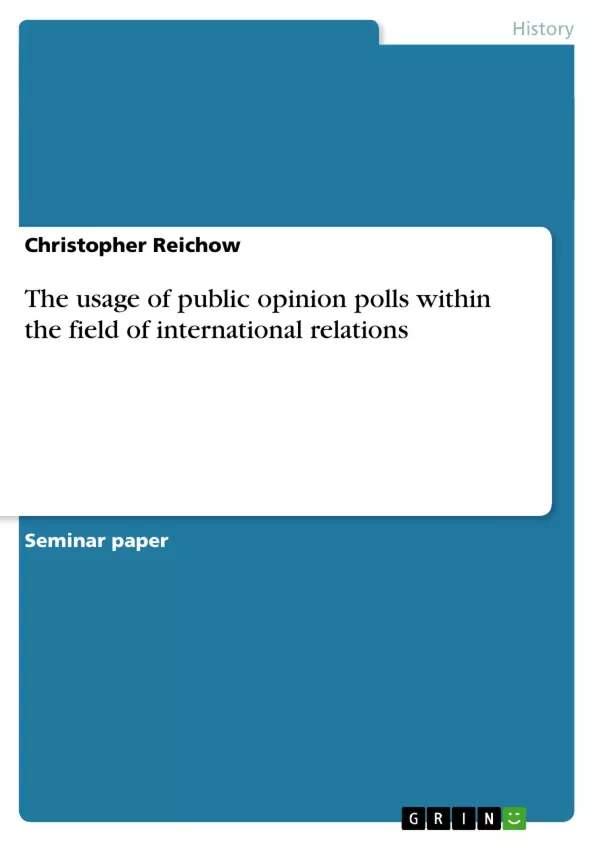By measuring the public’s attitudes, pollsters want to seek the truth and display the people’s belief. Polling organizations are claiming to reflect the opinion of millions of people by asking only a representative cross section of society. Every current political, social or economical issue, that is the credo, can be evaluated by the people’s opinion. But besides their possible value as a description of the current state or as a prognostication tool, the question arises, if quantitative polls can be used not only as a politological or sociological but as a historical source. By analyzing works about American surveys in West Germany after World War Two, the Israeli-Palestinian relations during the Second Intifada and the influence of the American occupation on the emergence of Iraqi nationalism after the Second Gulf War, this paper wants to examine, if opinion polls can provide a relevant source for historians of international rela-tions.
Until the 1960s, historians had not begun to develop scientific procedures to study past public opinions. A long lasting debate was held whether or not public opinion polls could be applied to the interpretation of history. Still, opinion polls are only used sparingly in historiographical fields. But more and more historians have incorporated this “hostile” sociology into their work. The here presented works are a good example for the fact that there is pretty much influence by sociological aspects.
Inhaltsverzeichnis (Table of Contents)
- The Usage of Public Opinion Polls within the Field of International Relations
- Introduction
- The History of Opinion Polls and their Usage in Historical Research
- American Surveys in West Germany after World War Two
- The HICOG Surveys
- The Success of the CDU/CSU
- The Growing Support of the Allies
- The Limitations of the HICOG Surveys
- The Israeli-Palestinian Relations during the Second Intifada
- The Influence of the American Occupation on the Emergence of Iraqi Nationalism after the Second Gulf War
- The Perception of the U.S. in Iraq
- National Identity and National Pride
- Conclusion
Zielsetzung und Themenschwerpunkte (Objectives and Key Themes)
This paper examines the historical value of public opinion polls as a source for historians of international relations. It analyzes three case studies: American surveys in West Germany after World War Two, Israeli-Palestinian relations during the Second Intifada, and the influence of the American occupation on the emergence of Iraqi nationalism after the Second Gulf War.- The history and development of opinion polls as a research method.
- The potential and limitations of using opinion polls as historical sources.
- The impact of public opinion on political decision-making in international relations.
- The influence of foreign intervention on the emergence of nationalism.
- The role of public opinion in shaping perceptions of conflict and peace processes.
Zusammenfassung der Kapitel (Chapter Summaries)
- The Introduction provides an overview of the paper's topic, research question, and methodology. It discusses the increasing interest in using opinion polls as historical sources and the need to examine their historical value.
- The second chapter reviews the history of public opinion polls and their use in historical research. It discusses the debate among historians about the applicability of opinion polls to the interpretation of history and highlights the growing acceptance of this method.
- The third chapter analyzes the use of American surveys in West Germany after World War Two, focusing on the HICOG surveys conducted between 1949 and 1955. The chapter discusses how these surveys revealed West German attitudes towards the Nazi regime, the new government, and the Allied presence. It also examines the limitations of the HICOG surveys, such as the focus on the American zone and the potential for bias.
- The fourth chapter examines opinion polls on both sides of the Israeli-Palestinian conflict during the Second Intifada. It analyzes the impact of public opinion on political decision-making and the two-level game played by politicians. The chapter demonstrates how opinion polls can provide insights into the dynamics of conflict and the role of public sentiment.
- The fifth chapter analyzes public opinion polls in Iraq from 2004 to 2007, exploring the relationship between foreign occupation and the emergence of Iraqi nationalism. The chapter discusses how the perception of the United States and the presence of US troops influenced the development of national identity and pride. It also highlights the importance of considering regional, ethnic, and social differences in public opinion.
Schlüsselwörter (Keywords)
This paper examines the use of public opinion polls as a source for historians of international relations, focusing on the topics of American surveys in West Germany, Israeli-Palestinian relations, the emergence of Iraqi nationalism, foreign occupation, nationalism, public opinion, and political decision-making. The research explores the potential and limitations of using quantitative surveys to analyze past events and understand public sentiment in international relations.Frequently Asked Questions
Can public opinion polls be used as historical sources?
Yes, while traditionally used in sociology, historians increasingly use polls to understand past attitudes, though they must be analyzed for potential bias and limitations.
What were the HICOG surveys?
HICOG surveys were conducted by Americans in West Germany after WWII (1949-1955) to measure German attitudes toward the Nazi past and the new democratic government.
How did polls influence the Israeli-Palestinian conflict?
Polls during the Second Intifada showed how public sentiment on both sides influenced political decision-making and the internal "two-level game" played by leaders.
What did polls reveal about Iraqi nationalism?
Surveys between 2004 and 2007 suggested that the American occupation played a significant role in the emergence of a specific Iraqi national identity and pride.
What are the limitations of using polls in international relations research?
Limitations include geographic bias (e.g., only surveying specific zones), the potential for respondents to give socially desirable answers, and the difficulty of capturing complex ethnic or regional nuances.
- Citar trabajo
- Bachelor of Arts Christopher Reichow (Autor), 2010, The usage of public opinion polls within the field of international relations, Múnich, GRIN Verlag, https://www.grin.com/document/179626



